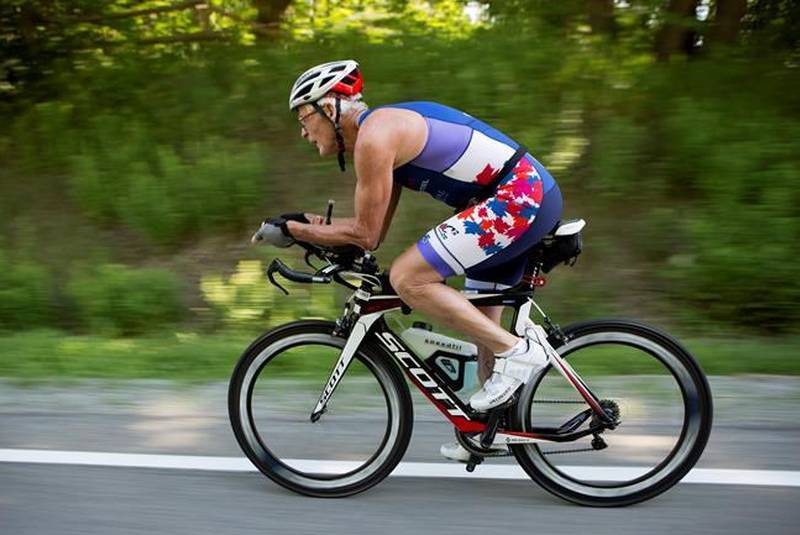Bob Knuckey wants to be the fastest man at the world Ironman championship among men in their eighth decades.
The 70-year-old retired teacher from Caledon, Ont., has pulled out all the stops in training to both win his age group Saturday in Kona, Hawaii, and to break the record currently held by another Canadian.
While the TV cameras will follow the professional triathletes racing for US$650,000 in prize money, there will also be more than 2,000 racing amateurs for whom Kona is also the holy grail of their sport.
“My two goals are to win my age group this year and, if the weather co-operates, break the record as well,” Knuckey told The Canadian Press.
“I’ve been thinking about this for a long while. I started I would say two or three years ago really putting a big focus on this.”
Knuckey (pronounced NUCK-ee) will be among 118 Canadians competing as age groupers Saturday.
The Kona record for men 70 to 74 over the 3.86-kilometre ocean swim, 180K bike ride and 42.2K marathon is eleven hours 45 minutes five seconds set by Regina’s Milos Kostic in 2011.
“When you are the baby in these age categories, the 70-year-old, versus the 74-year-old, you’ve got to be ready when your zero comes around,” said Knuckey’s coach Barrie Shepley.
A former marathoner, Knuckey completed his first Ironman in 2007 in Wisconsin just weeks after treatment for prostate cancer.
He won the men’s 70-74 division at this year’s Ironman Texas in 11:20.07, as well as the men’s 65-69 title at the 2013 Ironman Arizona in 10:44.09.
But Kona is considered the most challenging Ironman because of searing heat and variable crosswinds. Course records stand for years until a race with favourable weather conditions allows them to fall.
The top men have yet to race under the eight-hour barrier there.
Related: Long distance triathletes ready to battle the world
Related: Convincing age group win for Kelowna triathlete
Knuckey twice raced the world championship in Kona in his sixties, most recently finishing fifth in his age group in 2014 in just under 12 hours.
“If it’s a good day and not too hot and not too windy in Hawaii, my goal is do around 11:40,” he said.
By comparison, the fastest man in the inaugural Hawaiian Ironman in 1978 finished in 11:46.58.
Knuckey doesn’t have the running pace he once had and can’t log the same amount of training mileage he once did, but he compensates for that with swimming and biking.
“Believe it or not, my swimming has gotten faster,” he said. “My biking is a lot stronger. I don’t know why.
“You figure you’re getting older and you’re lacking muscles. My massage therapist seems to think my muscles have gotten stronger and my power on the bike has gotten stronger.
“I guess it’s because of all the training partners and workouts I’ve been doing.”
Knuckey is challenging some perceptions about what’s possible for “master” athletes, Shepley says.
“One of the things we try to do with our master athletes, it sounds weird, but as you age you want your rate of decay to be lesser than your competitors,” the coach explained.
“You try to make sure that rate of decay is less by strength training, by yoga and all of the things that Bob is doing.
“What I see in Bob, even though his run is just slightly slower than nine years ago, his swimming and biking is faster and his overall time is virtually what he did a decade ago and maybe even slightly faster.”
In a nod to his age, Knuckey is diligent about stretching, nutrition, massage and getting on top of aches and pains quickly.
“You have to listen to the body,” he said. “If something lasts more than three days, I’m getting chiro, I’m getting physio, I’m getting massage.”
Knuckey says he isn’t nervous about Saturday’s race, which is considered one of the ultimate tests of body and spirit.
“I try to keep happy thoughts in my head. I try to think about my past successes,” Knuckey said. “It’s not going to be easy, but I think I’ve done all the work that should get me to the finish line first.”
Donna Spencer, The Canadian Press



